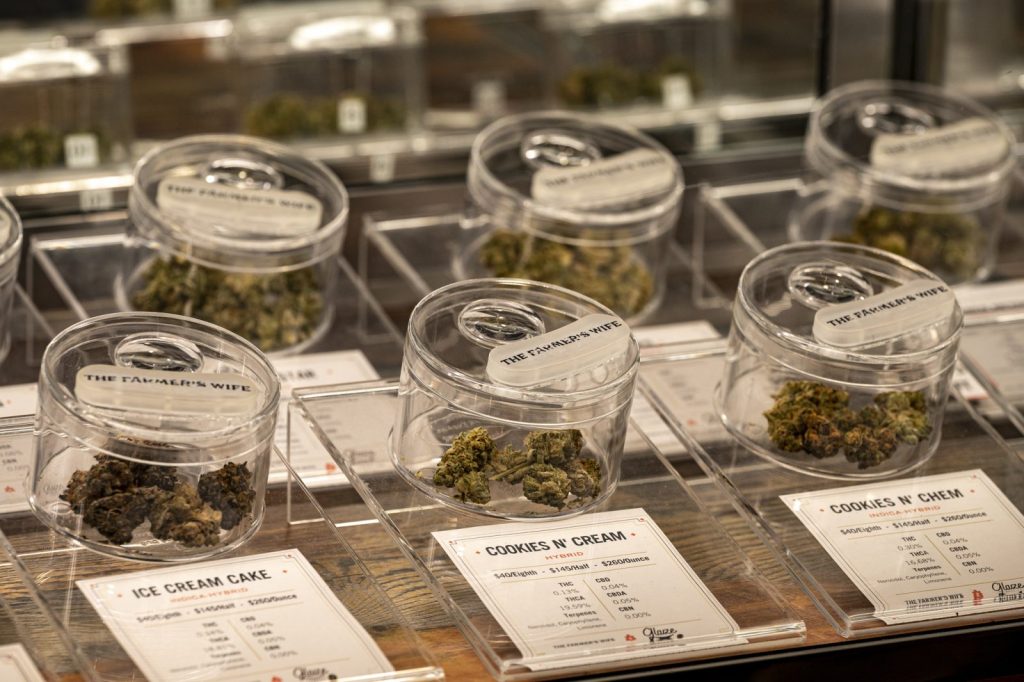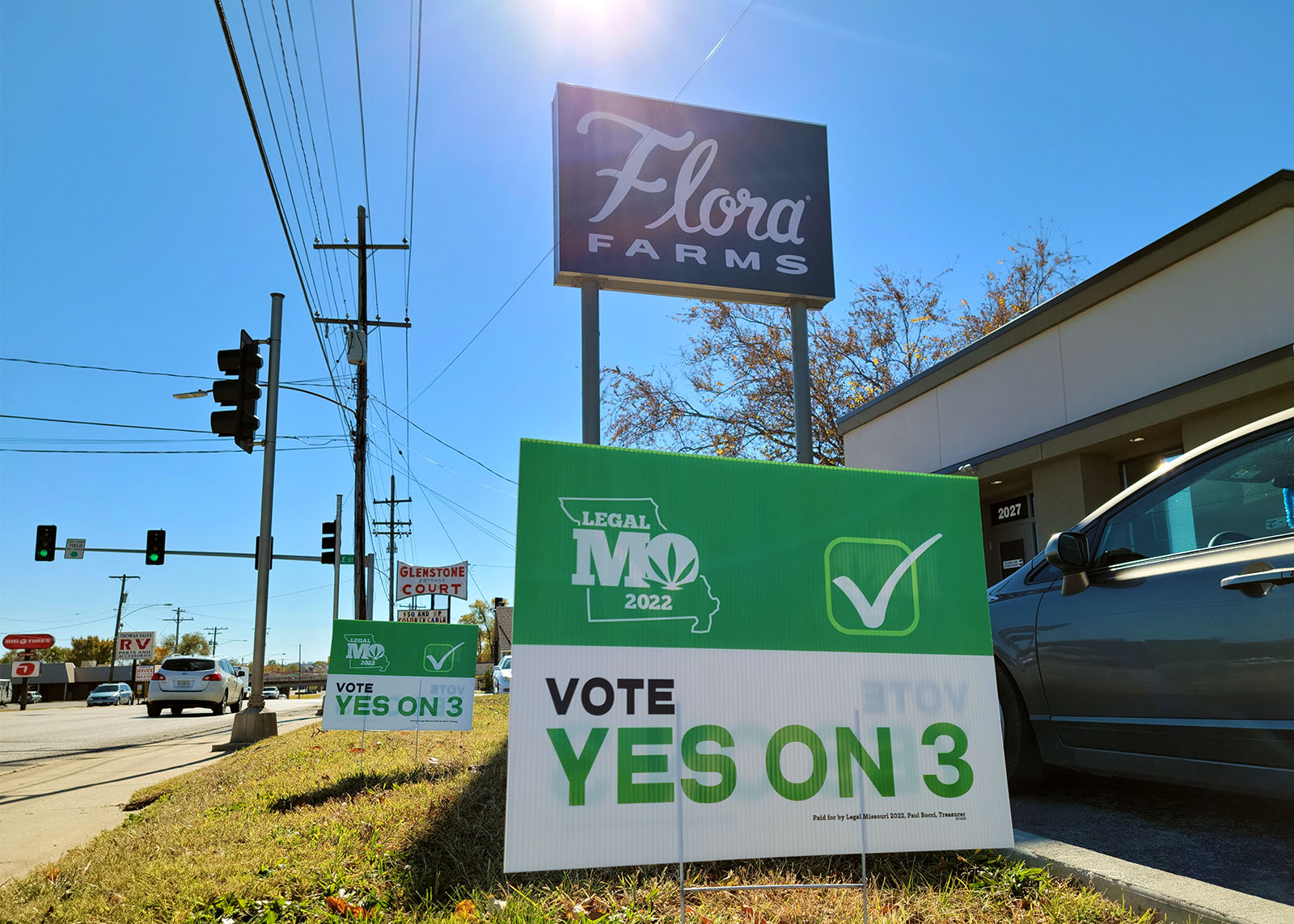Amendment 3 brings marijuana back before voters in the Nov. 8 general election. It has left the state, and Springfield, split in more ways than one.
Since Secretary of State Jay Ashcroft certified Aug. 9 that the initiative received enough signatures to be on the November ballot, advocates for and against the amendment have campaigned for their causes.
Multiple opposition groups have formed. Some are against recreational marijuana altogether, while others are supportive of some of the aspects of the amendment, but wary of others. Some of their concerns include the length, the licensing process, the expungement language, and the fact that it’s a constitutional amendment, which, if it passed, would make it very difficult to modify in the future.
Even some proponents acknowledge that legalizing marijuana through a 38-page amendment to Missouri’s constitution is not the ideal solution, but they say inaction by the legislature forced their hand.

“Missouri voters are overwhelmingly in favor of legalizing marijuana and that is why it’s on the ballot this fall,” said John Payne, the campaign manager for Legal Missouri 2022, a recreational marijuana advocacy organization based out of St. Louis that sponsored the amendment.
However, reports show support for Amendment 3 isn’t very clear, with different polls indicating different levels of support and opposition, and a significant percentage of undecided voters.
If passed, Amendment 3 would change Missouri Constitution in these ways (Click to expand for details):
- Remove state prohibitions on purchasing, possessing, consuming, using, delivering, manufacturing, and selling marijuana for personal use for adults over the age of 21
- Require a registration card for personal cultivation with prescribed limits
- Allow persons with certain marijuana-related nonviolent offenses to petition for release from incarceration or parole and probation and have records expunged
- Establish a lottery selection process to award licenses and certificates
- Issue equally distributed licenses to each congressional district
- Impose a 6 percent tax on the retail price of marijuana to benefit various programs
The six bullet points that outline the ballot measure on the Secretary of State website merely summarize the primary objectives, but don’t encompass all of the details in the 38-page Amendment.
Broad opposition has formed
Organizations opposed to the amendment include the Missouri Marijuana Legalization Movement, No on Amendment 3 (which is paid for by the Crossing Paths PAC) and the Missouri NAACP, among many others.
Eapen Thampy, a registered lobbyist and the campaign spokesman for No on Amendment 3, attended a ballot measure panel discussion at the Library Station in Springfield on Oct. 22.
Thampy is a proponent of legalizing recreational marijuana and large-scale expungement, but he is, however, strongly opposed to Amendment 3. He previously worked with Rep. Ron Hicks, R-St. Charles County, to forward recreational marijuana and expungement legislation, with no success.
Some of his current disagreements with Amendment 3 are with its licensing process, which Thampy believes doesn’t take enough of a free market approach and essentially establishes a monopoly.

While the amendment does create a cap on business licenses who can grow and sell marijuana, it would place limitations on how many licenses the largest operating corporations are permitted.
Additionally, it would create a “micro-licensing” program that attempts to favor small businesses licenses, with an emphasis on communities most impacted by marijuana-related incarcerations.
“A lot of the regulation for marijuana right now includes ideas like track and trace,” Thampy said. “You track the seed, to the plant, to the sale … With a free market approach, you don’t need track and trace, you don’t need the state watching on a video camera every plant that’s grown. All you need is public safety, product testing for consumer safety and enforcement.”
Also, despite previously being a supporter of a more broad and blanketing expungement, he now thinks the process should require some component of judicial review.
“The one-size fits all approach does not necessarily work 100 percent,” Thampy said. “The bill that Rep. Hicks worked on that I helped with this year, we would allow for petition-based expungement of marijuana offenses with traditional review.”
Additionally, Thampy is confident that marijuana is not far away from being federally legal, following President Joe Biden’s pardon of thousands of federal possession convictions on Oct. 6.
While not in unison on why, opponents find common ground in ‘No on Amendment 3’ campaign
Mary Byrne, who joined Thampy and the other panelists at the Library Station, is opposed to Amendment 3 as well, but for different reasons. Byrne is a Springfield-based education consultant, a co-founder of Missouri Coalition Against Common Core, and former candidate for Missouri’s 7th Congressional District.
Byrne, a strong opponent to critical race theory, says Amendment 3 focuses too much on disparate impact, a judicial theory that says that existing laws and policies result in a disproportionate impact of a protected demographic.
“It doesn’t really investigate background information and it doesn’t give the context in which the arrests were made,” Byrne said. “The whole point is that it undermines the Constitution’s theory of law about being colorblind and equal under the law.”

Local proponents try to make sense of opposition’s concerns
Local attorney Joseph “Chip” Sheppard from the Springfield-based Carnahan Evans law firm, attempted to break down some of the concerns of the opposition.
“I don’t know how [expungement] could be clearer,” Sheppard said. “We went into great detail as to how it reduces penalties or eliminates felonies. The expungement is the most radical provision of any state in the country so far, of all the states that have legalized or decriminalized marijuana because it’s automatic.”
Sheppard also addressed concerns around the licensing process that opponents fear could result in the creation of a monopoly, and suggested Missouri is trying to establish a safely regulated market.
“No one ownership group can have more than 10 percent of any license type,” he said. “So if you’ve got 65 cultivation facilities, no one ownership group could have more than six. When you look at most industries, the ownership is concentrated down in two, three, four, five competitors. In Missouri, we’re putting in the constitution it’s got to be at least 10 competitors per license type.”

Mark Hendren is the CEO of Flora Farms, a wholesale and retail cannabis operation based out of Humansville with three dispensary locations across southwest Missouri. He somewhat understands the concerns that Amendment 3’s licensing language could limit a free market approach, but asserts it’s necessary to establish a safe recreational industry.
Missouri has a limited license program, which, according to Hendren, allows the Department of Health and Senior Services to effectively administer and regulate the industry.
“It certainly makes some sense, posing more of what they would consider a free market approach,” Hendren said. “That’s a basic principle of American capitalism. However, we’re dealing with a new previously illegal product that needs to be regulated and controlled, and I think most Missourians agree with that. We all agree that we don’t want cannabis in the hands of minors, we don’t want the unregulated black market to be involved.”
Hendren, along with Sheppard, who is Flora Farm’s attorney, worked with the Legal Missouri 2022 committee to draft the proposed constitutional amendment.
“[Flora Farms is] one of the biggest supporters in the state,” Hendren said.
Legal MO 22: Not John Payne’s first rodeo
Amendment 3, born through the initiative petition process, is undergoing a similar path as medical marijuana.
Payne also was behind 2018’s Amendment 2, which passed with 65 percent of the vote. Amendment 2, now referred to as Article XIV of the Missouri Constitution, legalized medical marijuana. Payne, who, while in college, served in multiple roles for the nonprofit Students for Sensible Drug Policy, has long been an advocate for drug law reform.
With Amendment 3, Legal Missouri 2022 puts a strong emphasis on large-scale expungement, not only helping free and clear the records of individuals burdened with non-violent marijuana-related convictions, but freeing up law enforcement resources to focus on other crimes.
Additionally, they believe that the successful rollout of medical marijuana in Missouri indicated there is a robust market available for adult recreational use as well.

Let the ad wars begin
Hendren, a member of the finance committee for Legal Missouri 2022, has worked closely with the organization to ensure a large budget for their persuasion campaign, which began airing television advertisements in October.
Following a run-in with the Missouri State Highway Patrol that issued Legal Missouri 2022 a cease and desist order for displaying the MSHP emblem without authorization, the campaign tweaked the ads. All three of the campaign commercials promote the expungement component of the amendment, and the benefits its tax dollars could bring to veterans and law enforcement.
Springfield was an early battleground for the marijuana movement in Missouri
Sheppard conceded it would’ve been ideal for the General Assembly to pass a legalization law similar to Amendment 3, but he doesn’t see it happening, realistically.
“I have zero faith in the Missouri legislature and I think everybody else does too,” Sheppard said.
He also expressed déjà vu with the attempts made by a few legislators, including Hicks, in the last legislative session to legalize marijuana, suggesting that they knew Legal Missouri 2022 was out collecting signatures and wanted to get something passed before it could be on the ballot.
In 2012, there was an effort in Springfield to decriminalize marijuana in the city of Springfield through a ballot measure. However, to stop it from being successful, the City Council voted in favor of decriminalization — only to vote it out after the election. The American Victory Coalition, led by Payne and Miranda Reynolds, then hired Sheppard to sue the city of Springfield, who eventually settled at $240,000.
They then turned around to use that money to conduct statewide polling on medical marijuana, which resulted in about 65 percent of respondents in favor. This led to the eventual 2018 ballot initiative that legalized medical marijuana, which brought the state, and the movement, to where it is today.
Related articles (click to see story links):
- Missouri voters will decide whether to legalize marijuana this November election
- Recreational marijuana will be on Nov. ballot. What to know
- Scattershot polling leaves both sides of Missouri marijuana campaign optimistic
- Medical marijuana companies pour money into legalization PAC in campaign’s homestretch

